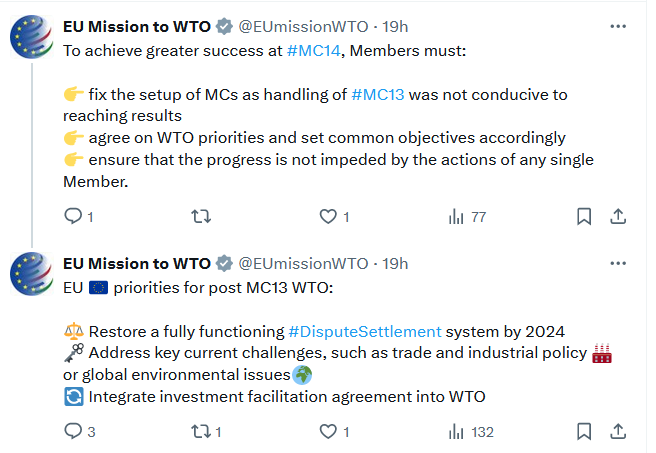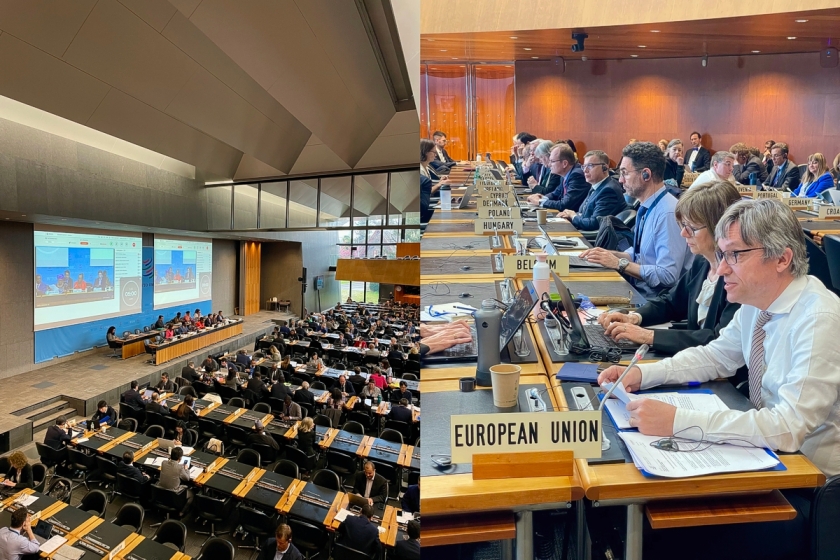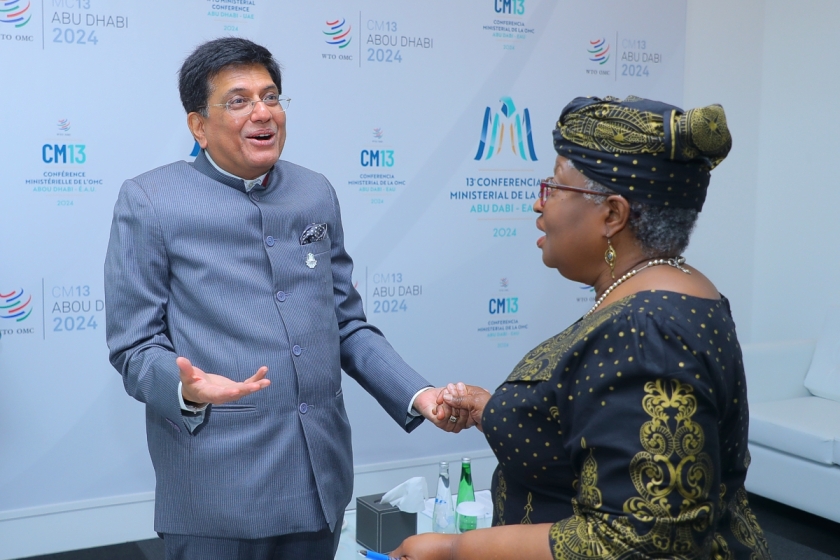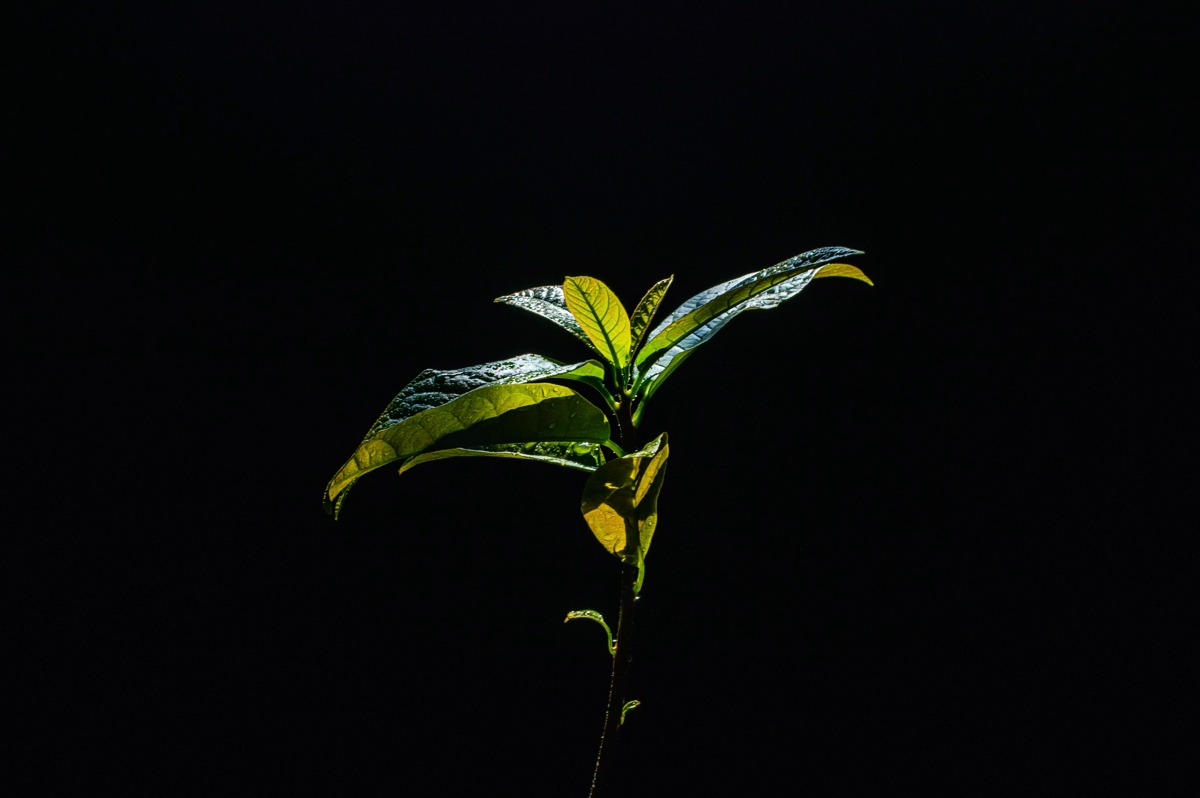SEE ALSO
Something needs to be done about plurilaterals (in Seven talking points after the WTO’s 2024 Ministerial Conference)
●
In General Council India alone opposes investment deal as a WTO agreement
Comment: on India’s claim that a plurilateral WTO deal is ‘illegal’
Technical note: types of plurilateral deals and adding them to WTO rules
Explainer: The 18 WTO plurilaterals and ‘joint-statement initiatives’
Technical note: Participation in WTO plurilateral talks
●
General Council minutes (published a few months after the meeting)
All articles tagged “investment facilitation”
By Peter Ungphakorn
POSTED MARCH 22, 2024 | UPDATED MARCH 23, 2024
India and South Africa, now joined by Türkiye, continued to block consensus on adding the 128-participant Investment Facilitation Agreement to the World Trade Organization’s rulebook when WTO members met as the General Council today (March 22, 2024).
The on-going resistance is a setback for the large number of countries that had hoped deals among only some of the WTO’s 164 members — known as “plurilateral” — could be a way to allow rule-making to develop among the willing without affecting others who are not ready.
Lack of consensus prevents “plurilateral” agreements from being part of the organisation’s official package of rules. That means WTO committees cannot be set up to oversee implementation and the agreements are not subject to legal proceedings under WTO dispute settlement.
Only three of the 36 non-participants have opposed adding this plurilateral agreement to the WTO’s rules. The US is a non-participant that has previously argued in favour.
At the February 26 to March 2 Ministerial Conference in Abu Dhabi, India was the sole objector preventing a proposed consensus decision by the ministers.
South Africa had previously shared India’s objections and the two were rumoured to be preparing a joint statement opposing the decision. In the end the statement was only issued by India but it was enough to block consensus.
South Korea called for ways to ‘raise the cost of objecting’ when a tiny number of countries persist in blocking consensus
In today’s General Council meeting, India’s ambassador Brajendra Navnit made a statement which one trade source called “animated”. He repeated India’s argument that the Investment Facilitation Agreement is illegal, because it was negotiated plurilaterally and because it is about investment.
South Africa is reported to have added that there is no precedent for using the provision of the WTO Agreement (Article 10.9) to annex a plurilateral agreement.
Türkiye, which withdrew from the plurilateral talks in early 2023, said among its objections were that the agreement does not define “investment” and does not clarify how the provisions relate to other WTO agreements.
According to sources, South Africa and Türkiye said they were willing to continue to discuss the proposal with its participants. India did not.
Several participants challenged those arguments.
Hong Kong is reported to have been the most upset. It said it was disappointed that the decision was not taken in Abu Dhabi, and rejected India’s argument that investment is not part of the WTO’s remit.
China proposed setting up a “dedicated process” to continue discussing the issue under the General Council, a view shared by several other participants, according to sources.
Participants said they would discuss non-participants’ concerns constructively in Geneva and in capitals, including with highest political leaders.
Participants who spoke under this agenda item included: Argentina, Barbados, Cambodia, China, Ecuador, El Salvador, the EU, Guatemala, Guyana, Hong Kong, South Korea, Laos, Malawi, Mali, Nicaragua, Nigeria, Niger, Panama, Peru, the Philippines, Russia, Singapore, Switzerland, Thailand, the UK, Venezuela and Zimbabwe .

Also part of assessing Abu Dhabi
The issue also came up earlier in the General Council’s agenda when members spent much of yesterday (March 21, 2024) assessing more broadly the Abu Dhabi conference.
Several criticised small numbers of members — and in some cases only one — who prevented decision-making by blocking consensus.
South Korea called for ways to “raise the cost of objecting” when a tiny number of countries persists in blocking consensus, sources said. It suggested increasing transparency so the blocking members are identified and their justifications scrutinised, in order to increase pressure from fellow members and public opinion.
South Korea is a coordinator (with Chile) of the investment facilitation negotiations, although its concerns could include tactics that hold other subjects hostage, such as fisheries subsidies and agriculture.
![]()
MC13 confirmed what we’ve all known — that adopting a lose-lose negotiating posture is not conducive to results
— WTO chief Ngozi Okonjo-Iweala
WTO Director-General Ngozi Okonjo-Iweala referred to the issue in her statement to the General Council on the Ministerial Conference, but less directly.
“MC13 [the 13th WTO Ministerial Conference in Abu Dhabi] confirmed what we’ve all known — that adopting a lose-lose negotiating posture is not conducive to results,” she said.
“I urge you not to damage an organization that is critical for some, especially small developing countries, and middle powers. Therefore, as you reflect on [the Ministerial Conference], I urge you to think about what is helpful for the people we are here to serve and adopt a win-win approach for the greater good.”
The phrase “lose-lose” is said to have been repeated in today’s session on investment facilitation.
The General Council’s minutes are published a few months after the meeting

Obstacle to WTO reform
In one case, on services domestic regulation, a plurilateral agreement has been able to sidestep the need for consensus by turning the new disciplines into individual countries’ commitments instead of a stand-alone set of rules. But that route is unavailable for deals that span areas of trade that are not specifically about goods or services, such as on investment or electronic commerce.
India’s opposition effectively blocks an option that some members consider to be part of broader WTO reform. Plurilateral activity is seen as an alternative when WTO-wide (or “multilateral”) talks are struggling to find the consensus needed to reach agreement.
For example, multilateral talks on agriculture and fisheries subsidies were both deadlocked at the Abu Dhabi Ministerial Conference. All references to them were removed from the final declaration. Proposed decisions on agriculture and fisheries subsidies were binned.
Participants in the investment facilitation deal want to add their text to the WTO Agreement under Annex 4 — the section of the agreement specifically for plurilateral deals. Investment facilitation would join the plurilateral Government Procurement Agreement (49 WTO members participating) and Civil Aircraft Agreement (33 signatories).
![]()
THE SEVEN SECTIONS
of the Investment Facilitation Agreement:
1. Scope and General Principles
2. Transparency of Investment Measures
3. Streamlining and Speeding up Administrative Procedures
4. Focal Points, Domestic Regulatory Coherence and Cross-Border Cooperation
5. Special and Differential Treatment for Developing and Least-Developed Country Parties
6. Sustainable Investment
7. Institutional Arrangements and Final Provisions
Investment facilitation is partly modelled on the (multilateral) Trade Facilitation Agreement. It would streamline participants’ rules and regulations for foreign investment, including making them more transparent and predictable. It would offer participating developing countries assistance in implementing the new disciplines. A novel feature is sustainability.
Participants would apply the disciplines equally to all WTO members whether they participate or not (applying the “most-favoured nation” principle of non-discrimination). Non-participants would be free riders. (More details here.)

Born in 2017, agreed in 2023
Participants announced on July 6 last year (2023) that they had concluded their negotiations. They had an agreed draft text, which they said they would take to the rest of the WTO’s members in the hope that the others would join in and it could become fully multilateral.
In October 2023, they admitted defeat and announced they would continue as a plurilateral group, with the aim of inserting their text under Annex 4 of the WTO Agreement.
Work continued on the text to ensure it was legally correct and so that it could be issued in all three official WTO languages: English, French and Spanish. On November 27, the participants circulated the final text.
Just over a fortnight later on December 18, 2023, the proposal to annex the agreement was discussed in the WTO General Council, when India said it would block it. Some non-participants, including the US, said it should be annexed.
That text, with a new cover note, is the one that was submitted to ministers in Abu Dhabi.
The negotiations were one of several “joint-statement initiatives” (JSIs) on discussing new subjects among countries that were willing to do so.
The original joint statement on investment facilitation was issued by 69 WTO members (counting the EU as 28) at the Buenos Aires Ministerial Conference in early December 2017.
When the final text was circulated two years later, the number of participants had risen to 117. Total participation is now 128 (78% of the 164 WTO members).
Since the original 2017 joint statement was issued, participation has almost doubled, with 59 more members joining in.
![]()
PARTICIPANTS
Investment facilitation for development
March 22, 2024
Afghanistan; Albania; Angola; Antigua and Barbuda; Argentina; Armenia; Australia; Austria; Bahrain; Barbados; Belgium; Belize; Benin; Bolivia; Brazil; Bulgaria; Burkina Faso; Burundi; Cabo Verde; Cambodia; Cameroon; Canada; Central African Republic; Chad; Chile; China; Colombia; Congo; Costa Rica; Côte d’Ivoire; Croatia; Cyprus; Czech Republic; Denmark; Democratic Republic Congo; Djibouti; Dominica; Dominican Republic; Ecuador; El Salvador; Estonia; European Union; Finland; France; Gabon; Gambia; Georgia; Germany; Greece; Grenada; Guatemala; Guinea; Guinea-Bissau; Honduras; Hong Kong; Hungary; Iceland; Indonesia; Ireland; Italy; Japan; Kazakhstan; Rep. Korea; Kuwait; Kyrgyz Republic; Laos; Latvia; Liberia; Lithuania; Luxembourg; Macao; Malawi; Malaysia; Maldives; Mali; Malta; Mauritania; Mauritius; Mexico; Moldova; Mongolia; Montenegro; Morocco; Mozambique; Myanmar; Netherlands; New Zealand; Nicaragua; Niger; Nigeria; North Macedonia; Norway; Oman; Panama; Papua New Guinea; Paraguay; Peru; Philippines; Poland; Portugal; Qatar; Romania; Russia; Saudi Arabia; Seychelles; Sierra Leone; Singapore; Slovak Republic; Slovenia; Solomon Islands; Spain; Suriname; Sweden; Switzerland; Taiwan; Tajikistan; Thailand; Togo; Tonga; Uganda; United Arab Emirates; United Kingdom; Uruguay; Vanuatu; Venezuela; Yemen; Zambia; Zimbabwe (128)
(As listed in the revised draft 2024 Ministerial Declaration and the WTO web page on investment facilitation (accessed March 22, 2024). Burkina Faso, Côte d’Ivoire, Dem. Rep. Congo, Venezuela and Tonga joined most recently. Colombia and Taiwan were restored to the list. Earlier, Ghana, Pakistan and Türkiye dropped out)
Sources are here
See also: Friends of Multilateralism Group video on the Investment Facilitation Agreement, 47 minutes, March 19, 2024
Updates:
March 23, 2024 — edits to correct typographical errors and to correct minor details such as incorrect historical dates; some hyperlinks added
Image credits:
Main image | Imso Gabriel, Unspalsh licence
Photos of General Council | EU WTO mission on X (Twitter)
Indian minister and WTO director-general | WTO/Prime Vision



